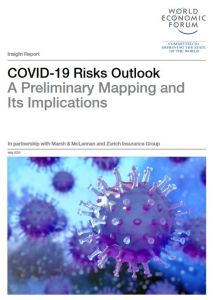Join getAbstract to access the summary!

Join getAbstract to access the summary!
Emilio Granados Franco, Richard Lukacs, Marie Sophie Müller, Philip Shetler-Jones and Saadia Zahidi
COVID-19 Risks Outlook
A Preliminary Mapping and Its Implications
World Economic Forum, 2020
What's inside?
COVID-19 is going to leave a lasting mark on the world – economically, politically and societally.
Recommendation
Global efforts to contain and mitigate the damage caused by the novel coronavirus pandemic have revealed a number of weaknesses in political, economic and societal systems in many nations. While the long-term effects of the crisis remain uncertain, it’s no surprise that, according to the World Economic Forum’s survey of nearly 350 senior-level executives, the world’s top risk managers see a deep recession as the biggest threat. The report offers a nuanced look at how COVID-19 might skew tax policy, sabotage sustainability efforts and create destabilizing levels of unemployment.
Take-Aways
- The coronavirus pandemic could result in a prolonged recession.
- Lockdowns helped reduce emissions; but, ultimately, the pandemic could undermine climate change mitigation efforts.
- COVID-19 could take a sustained toll on jobs and wages.
Summary
The coronavirus pandemic could result in a prolonged recession.
For its COVID-19 Risks Perception Survey, the World Economic Forum sought feedback from more than 300 senior-level professionals. These risk managers expressed the most anxiety about economic damage from the pandemic. Fully two-thirds of respondents said their primary worry was that the coronavirus would plunge the world into a protracted recession. Other concerns included the possibility of a wave of business failures, industry consolidation, interruption of supply chains and a potential spate of cyberattacks. What’s more, the public sector’s robust – and costly – response to the crisis could weigh down government budgets for years.
“COVID-19 has forced drastic containment measures, diminished economic activity and required fiscal and monetary actions worth trillions of dollars to protect jobs and markets while the economy is in hibernation.” ”
Even before the pandemic spread across the globe, the world’s governments struggled with debt. In the G20 economies, 2019 debt levels as a share of gross domestic product (GDP) hit a record high. Then COVID-19 arrived. The huge stimulus packages issued by advanced economies mean that public debt as a share of GDP will soar to 122% of GDP in 2020, up from 105% of GDP in 2019. How can governments pay for the stimulus? Higher taxes are a possibility, but many hard-hit industries are in no position to pay more taxes. That leaves the select few thriving industries – namely supermarket chains, pharmaceuticals companies and software firms – to bear the brunt of any new tax burden.
Lockdowns helped reduce emissions; but, ultimately, the pandemic could undermine climate change mitigation efforts.
Global quarantines greatly reduced air pollution. Emissions plunged by 25% in China and by about 8% globally, based on a comparison of the early months of 2020 to the same period in 2019. It’s possible, however, that governments will be so eager to regain lost economic growth that, moving forward, they’ll abandon green initiatives. It’s worth noting that the world would need to cut emissions by 7.6% a year, every year, for a decade to meet previously established goals on climate change. In one telling comparison, the Great Recession reduced global emissions by 1% in 2009, but pollution then jumped by 5% as economic stimulus spurred industrial activity. Low oil prices pose another risk, as they will lessen the urgency of the green agenda.
“Some governments have already relaxed or suspended environmental protection regulations to ease industrial activity.”
The pandemic underscored the importance of global cooperation, yet it also stirred nationalist urges that will make cross-border collegiality more difficult. Officials have pushed the 2020 UN Climate and Biodiversity meetings back to 2021. Moreover, there’s a real possibility that, as world leaders focus on protecting public health and stoking economic recovery, climate change mitigation will fall off of the priority list. In a cruel irony, global warming creates ripe conditions for new pathogens to thrive, raising the probability of new pandemics.
COVID-19 could take a sustained toll on jobs and wages.
Unemployment soared in the United States and elsewhere as a result of the pandemic. While many white-collar employees shifted to remote work, blue-collar workers and those in the service sector didn’t enjoy the same flexibility. Developed nations responded to COVID-19 by spending heavily on health care and unemployment benefits; but weak economic growth in the coming years could hamper public investment in housing, food, schools and other social programs.
“COVID-19 and the resulting economic crisis may lead to sustained unemployment, deeper inequality, generational frictions and continued stress on people’s well-being.”
Meanwhile, the pandemic threatens to spawn a lost generation as young workers find themselves locked out of labor markets. Nearly half of all respondents to the World Economic Forum survey said that the pandemic will likely result in enduring unemployment, especially among young people. Youth unemployment was a growing problem in the developing world, even before the pandemic struck. COVID-19 rocked the global economy just as employment for young people had finally returned to pre-2008 levels. At the same time, the jobs of many young workers are of the independent contractor or gig worker variety – a particularly precarious sort of employment. Reflecting their less-than-robust prospects, the percentage of young workers who make more than their parents is at a record low.
About the Authors
The World Economic Forum is an NGO committed to improving the state of the world via public-private cooperation. The organization is headquartered in Switzerland.
This document is restricted to personal use only.





















Comment on this summary